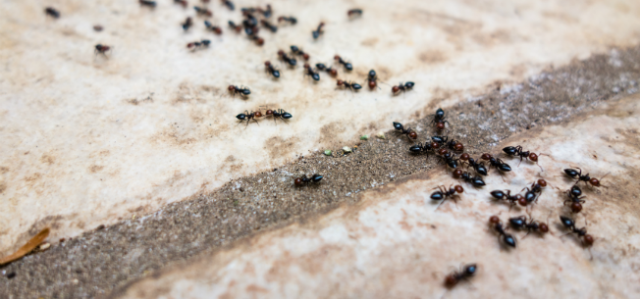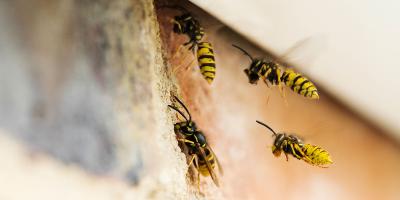Local Field Guide To Ants In New England: House, Carpenter, Fire, & More

If you’ve ever come home to a nice long line of ants marching around your kitchen, chances are you know just how frustrating these household invaders can be. Whether they’re stealing sugar and other snacks or making a nest in your wall, ants can be a seriously destructive - and disgusting - pest to have around.
But while many of the most common ant species may appear very similar or behave in similar ways at first glance, there are actually hundreds of types of ants out there waiting to get into your home and make themselves comfortable. By knowing some of the most common varieties you’re likely to encounter, you can target the problem with the proper solution from the very beginning - putting you one step closer to ant-free living all summer long.
Odorous House Ants
Although immediately noticeable for their small size, Odorous House ants may be most well known for the foul, rotten coconut odor given off when this ant is crushed. This smell is what gives Odorous House ants their name, and homeowners who’ve dealt with them before know that simply killing the ones you see is just not an option - if not for the smell, than because it doesn’t truly address the infestation in moist areas of your home like wall voids near hot water pipes, near heating units, beneath leaky fixtures, and even inside wood that has been damaged by termites.
Slow-acting bait traps may be a good solution to taking care of Odorous House ants, since ants who consume the bait are more likely to bring the bait back home to feed the queen, nest workers, and brood. If this does not work, a pest management professional may need to spray to keep colonies from getting a foothold in your home.
Fire Ants
Although actually referring to a variety of species of aggressive, stinging ants, the fire ant has notoriously come to be known in North America as an invasive and highly troublesome pest that can cause serious trouble if left unchecked. Called “fire ants” for their reddish-brown color and for the burning sensation many feel after coming into contact, these insects can make for some seriously unpleasant days if they come invading your picnic or make their way into your house.
Fire ants originally come from tropical climates, and so they tend to seek out warm, humid locations to make their nest. If you notice fire ants starting to get comfortable in your space, seal off as many entrance points from the outside as possible and utilize bait traps, if need be.
Carpenter Ants
Although we generally think of termites as the most destructive wood-eating pests round, Carpenter ants can actually pose a significant threat to your household’s health and safety. That’s because Carpenter ants don’t actually feed on wood, they feed on the same foods as many other ants - meats and sweets. Instead, Carpenter ants simply burrow through wet or old wood to make access tunnels, and will keep expanding and burrowing as long as the colony continues to expand - doing serious damage to your structure in the process.
Often, a carpenter ant colony nested in a home will not actually be the main nest, but a satellite designed to make collecting food easy. The main Carpenter ant nest will typically be found outside in a wooden structure, like a tree or a wood pile. Attacking these main nests, and sealing off points of entry, can help keep your walls Carpenter ant free.
Pavement Ants
If there’s any pest that can be called “hard-headed,” it’s the Pavement ant. That’s because this determined invader skips the usual hiding places and nests directly underneath or in the cracks of stone walkways, bricks, patios, driveways, and other hard, stony areas. Homeowners can usually spot the piles of dirt and debris that Pavement ants pile at the entrance of their nests, or notice winged “swarmer” ants dead on the ground after their mating flights.
Since pavement ants are prolific eaters - taking in just about everything, from insects and plant materials to fruits, meats, and food scraps - and not afraid to forage far from the nest, taking on a colony with the standard bait traps may not be the most ideal solution. Calling a pest management professional to spray and monitor the situation may be the best way to get Pavement ants out from under your property.
Pharaoh Ants
If there’s one ant species that’s determined to “rule” the pest game, it’s the Pharaoh Ant. These light colored, almost translucent ants have proven to be notorious indoor pests nearly worldwide, with huge colonies affecting residents everywhere from Australia to Canada. That’s, in part, because Pharaoh Ants are highly effective colonizers, creating huge supercolonies with multiple queens that can spread out and dominate even other pests in the area.
If you notice these distinctively-colored invaders around your indoor area, you may already be experiencing an onslaught from an established colony. A pest management professional can help keep Pharaoh ants from spreading further and remove the ones that are there to keep your home from falling prey to this quickly-expanding pest.
Citronella Ants
When most homeowners think “citronella,” they probably think about those lemony candles meant to keep bugs away. That’s why you might be surprised to smell this same sweet scent after crushing a small, yellow Citronella ant, which releases special scented chemicals when threatened or stepped on. This relatively-harmless odor is generally meant to help escape from predators, but it can become quite a nuisance if left unchecked for too long.
Although Citronella ants generally leave homes and indoor spaces alone (they prefer to be outdoors and don’t usually look to set up colonies inside), they may still come looking for food or shelter in the cracks in your foundation or under your stone patio or driveway. If you notice Citronella ant colonies sprouting up closer and closer to your home, it may be time to call a pest management professional to clean the problem up safely.
So Many Pests, So Little Summer
For those dealing with pest control in New Hampshire, the warm season can feel short enough without having to stress over ant invaders. Don’t let your summer be overtaken by ants, and get in contact with JP Pest Services to keep your home and yard ant-free. That way, you can enjoy the season in peace, no ants included.



